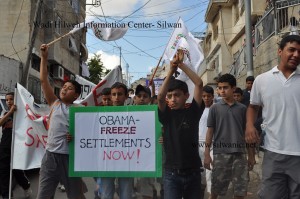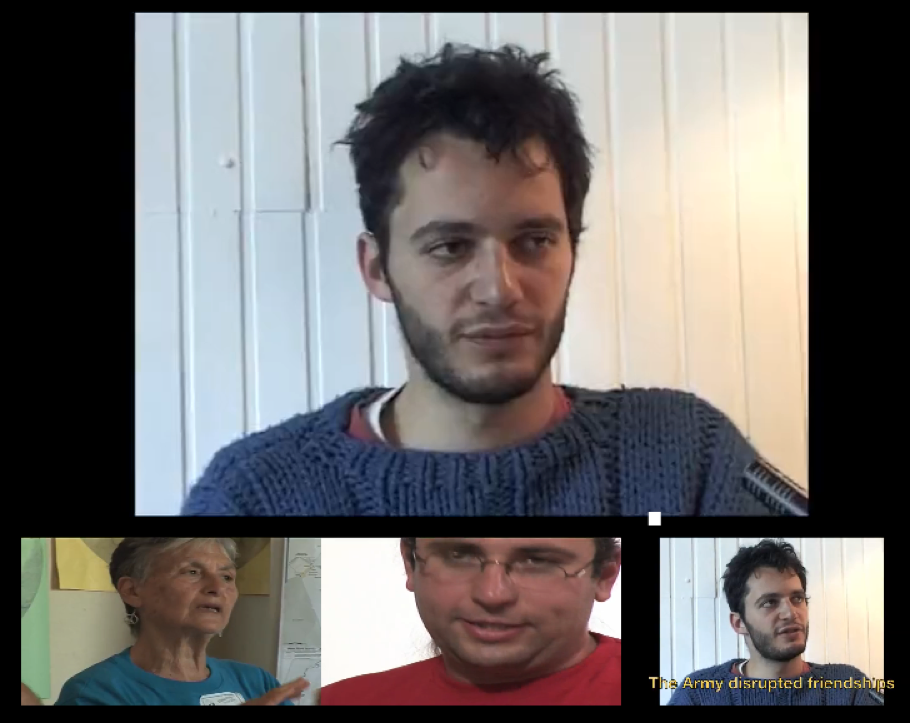The Only Democracy? » On The Ground Reports » Nocturnal Terror in Silwan
Nocturnal Terror in Silwan
Ed’s note: Here is a story that ran earleir this week in Just Jerusalem. We are reposting it here in advance of an interview with the author, Daniel Dukarevich with additional actions expected this weekend. You can follow live tweets by Daniel from Silwan at JVP’s twitter feed right now, Saturday July 3rd.
Another night sets in on Silwan. Just two days ago, hundreds of Israeli and Palestinian demonstrators marched together along the narrow streets of the neighborhood, to support the local residents, facing the municipality’s plan to demolish 22 houses. But here, as anywhere in east Jerusalem, happenings do not cease for a moment.
In previous weeks, more and more appeals to the solidarity activists of Sheikh Jarrah came in from the residents of Silwan. In view of our successful campaign, more and more Palestinians have been trying to find a way for Arab-Jewish cooperation. During recent tours in Silwan, we all had a sense of urgency and shared destiny. We must act, and act fast, before catastrophe hits us, before the abyss becomes too deep and wide to bridge. And we must act together, against all the risks and against all the suspicion which has built up here over the years.
And now we are here, climbing up the narrow alleys, together with the locals. Just one hour ago, tens of private security guards, escorted by border policemen, entered Palestinian homes around “Beit Hadvash” (house of honey in Hebrew…) and “Beit Yehonatan”. The settlers have only managed to seize two houses in this area, but this is enough to bring the place to the brink of eruption. Nightly border police patrols, private security personnel, armed with guns, undercover policemen and “Mistaarvim” (Israeli soldiers disguised as Arabs) have turned the place into a war zone.
This alley is narrow, dark. Tens of meters above us, shots are being fired and explosions can be heard. A helicopter is hovering above us, projecting rays of light onto alleys where the municipality has never thought of installing street lights. Twenty activists cling to the walls, and keep going forward.
All of a sudden the alley comes to an end, and a battlefield lies ahead of us. The small street around Beit Hadvash is all strewn with rifle bullet casings, unexploded grenades and the parts of destroyed cars. The soldiers are standing in groups at the entrances to houses and on the balconies, shooting into the houses around them. Our group disperses immediately into various houses, among groups of locals gazing with despair at what is happening around them. I run after a Palestinian paramedic into one of the houses. Soldiers are hiding in the stairway, blocking us, and trying to prevent us from progressing. Eventually they let us pass, and we reach the wounded. The three-story house is full of tear gas. The windows are all shattered, their frames lying on the floor. We go up, floor by floor, scanning the apartments. In most of them, we find families huddled together, scared people, little children, women, and wounded people lying on the floor. In the living room of one apartment, a young girl is lying on a stretcher. For two hours she has been waiting to be evacuated, after the soldiers had prevented ambulances from moving in. And in the next room I can see a few little children sitting in front of the computer. That’s just the way it is here. Apartments, families, a life that has suddenly become hell. But some of those living here insist on going on with their lives.
The wounded are taken down, one by one, on stretchers, into the street. From here one still has to run quickly, a few hundred meters along the alleys, towards the ambulances on standby. During one of the “heats”, I fall behind, momentarily fearing the race between the gas grenades and the rubber bullets. And staying alone here is bad. I try to stay close to the wall, but it doesn’t seem to help. Two gas grenades land next to me. Goddammit, they could have seen me just a second ago, they knew I was trying to evacuate the wounded. Not that it matters. Luckily, a few locals rescue me from that alley. After one hour, it’s all over. The soldiers withdraw towards the outskirts of the neighborhood, leaving behind a trail of devastation. A leaking water pipe, cars smashed by military jeeps and shooting, shattered windows and five wounded people. And tens of families who are about to sleep outside their tear gas flooded apartments, tonight too. And all this in the name of defending a house where nobody has ever lived, a house which, according to the owner’s claim, the settlers simply took over one day.
As we leave the neighborhood, escorted by our Palestinian friends, we know clearly that there is nothing left to do, except that which has already been done. Just as we have stood in Sheikh Jarrah until tonight, we shall stand in Silwan. And we shall return any time our presence is needed, until someone up there understands this obvious reality. This injustice, this folly, of settlement, especially in the heart of Palestinian neighborhoods, must come to an end.
P.S There is some comfort in seeing that this time the Israeli media did not ignore the events, thanks to the good work done by the solidarity activists.
Read the Physicians for Human Rights-Israel report on the violence here.
Watch a video of the police violence in Silwan.
Scenes of the joint protest in Silwan, in Arabic.
Video from earlier this month showing the private security guards and police.
Filed under: On The Ground Reports · Tags: Evictions, Settlers, Sheikh Jarrah, Silwan









 “You have a choice! Israeli Anti-Militarists Speak”
“You have a choice! Israeli Anti-Militarists Speak”